|
|
|
Sort Order |
|
|
|
Items / Page
|
|
|
|
|
|
|
| Srl | Item |
| 1 |
ID:
116687
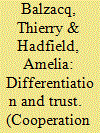

|
|
|
|
|
| Publication |
2012.
|
| Summary/Abstract |
One recent but major policy occurrence in Justice and Home Affairs - the Treaty of Prüm (2005) - has developed within the framework of differentiated integration, thus reopening the debate over the impact of flexibility on EU integration, what causes it, and whether it should be sought by Member States at all. Whatever the consensus, the debate itself demonstrates that the very idea of differentiated integration deserves a renewed attention today ultimately because it affects, in one way or another, the performance of the EU. This article presents a critical analysis of the practice of differentiation in Justice and Home Affairs, by examining its forms, principles and effects. It discusses the literature on the subject, emphasizing the complexity of flexible integration, but reaches different conclusions. Thus, in contrast to the dominant argument, we argue that differentiation is not necessarily about deepening and/or widening EU integration. It is also, and sometimes primarily, about power and interests, two major elements that feed mistrust among Member States. In fact, we demonstrate that mistrust can cause poor differentiation. Moreover, in the absence of trust among Member States, flexibility might contribute to sub-optimal policies. Based on past research and interviews, we substantiate our claim by investigating the driving factors, rationales and consequences of the Treaty of Prüm on the institutionalization of a EU area of Freedom, Security and Justice.
|
|
|
|
|
|
|
|
|
|
|
|
|
|
|
|
| 2 |
ID:
138085
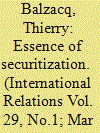

|
|
|
|
|
| Summary/Abstract |
One of the great appeals of securitization theory, and a major reason for its success, has been its usefulness as a tool for empirical research: an analytic framework capable of practical application. However, the development of securitization has raised several criticisms, the most important of which concern the nature of securitization theory. In fact, the appropriate methods, the research puzzles and type of evidence accepted all derive to a great extent from the kind of theory scholars bequeath their faith to. This Forum addresses the following questions: What type of theory (if any) is securitization? How many kinds of theories of securitization do we have? How can the differences between theories of securitization be drawn? What is the status of exceptionalism within securitization theories, and what difference does it make to their understandings of the relationship between security and politics? Finally, if securitization commands that leaders act now before it is too late, what status has temporality therein? Is temporality enabling securitization to absorb risk analysis or does it expose its inherent theoretical limits?
|
|
|
|
|
|
|
|
|
|
|
|
|
|
|
|
| 3 |
ID:
183699
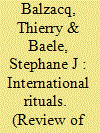

|
|
|
|
|
| Summary/Abstract |
The performance of ritual and the ritualisation of performance are the two main theoretical repertoires of ritual study in international politics and beyond. However, they also escalate tensions between those who insist on ritual's ability to operate by virtue of participants’ presence and those who believe that global networks of media call for a representational turn, which must tie participants and audiences across borders. Should we fail to understand how these distinct theoretical repertoires interact, it would be difficult to study international ritual, identify its functions, and trace its effects. Anchored in the sociology of ‘social occasions’, this article weaves ritual's patterns, properties, and resources into a coherent analytical framework. The framework enables us to better to grasp how actors move between/within different worlds (ritual and performance) and to what effects. The comparative study of two post-terrorism ritual occasions (the 2011 Rose March in Oslo and the 2015 Republican Marches in France) illustrates the usefulness of this theoretical proposition and its related framework.
|
|
|
|
|
|
|
|
|
|
|
|
|
|
|
|
| 4 |
ID:
138084
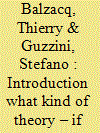

|
|
|
|
|
| Summary/Abstract |
One of the great appeals of securitization theory, and a major reason for its success, has been its usefulness as a tool for empirical research: an analytic framework capable of practical application. However, the development of securitization has raised several criticisms, the most important of which concern the nature of securitization theory. In fact, the appropriate methods, the research puzzles and type of evidence accepted all derive to a great extent from the kind of theory scholars bequeath their faith to. This Forum addresses the following questions: What type of theory (if any) is securitization? How many kinds of theories of securitization do we have? How can the differences between theories of securitization be drawn? What is the status of exceptionalism within securitization theories, and what difference does it make to their understandings of the relationship between security and politics? Finally, if securitization commands that leaders act now before it is too late, what status has temporality therein? Is temporality enabling securitization to absorb risk analysis or does it expose its inherent theoretical limits?
|
|
|
|
|
|
|
|
|
|
|
|
|
|
|
|
| 5 |
ID:
057764


|
|
|
| 6 |
ID:
157741


|
|
|
|
|
| Summary/Abstract |
The use of numbers has been remarkably effective at pressing global claims. While research has documented the historical processes through which numbers gained such prominence, and has examined the political and ethical consequences of this omnipresence, very little is known regarding the specific ways in which numbers create the outcomes that sustain governance. This article proposes to close that gap. Building on the literature that acknowledges that numbers not only describe things but also have profound impacts on things themselves, this article offers an integrated account of the working dynamics of numbers in the governance of security. To do so, the article identifies three distinct but connected vectors of power through which numbers shape security governance: persuasion, (de)politicisation, and standardisation. These insights are exemplified through the prism of different empirical examples, the variety of which aims to display the advantages of the approach we propose.
|
|
|
|
|
|
|
|
|
|
|
|
|
|
|
|
| 7 |
ID:
101571
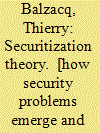

|
|
|
|
|
| Publication |
London, Routledge, 2011.
|
| Description |
xiv, 258p.
|
| Standard Number |
9780415556279, hbk
|
|
|
|
|
|
|
|
|
|
|
|
Copies: C:1/I:0,R:0,Q:0
Circulation
| Accession# | Call# | Current Location | Status | Policy | Location |
| 055629 | 355.033/BAL 055629 | Main | On Shelf | General | |
|
|
|
|
| 8 |
ID:
151001


|
|
|
|
|
| Summary/Abstract |
Securitization theory seeks to explain the politics through which (1) the security character of public problems is established, (2) the social commitments resulting from the collective acceptance that a phenomenon is a threat are fixed and (3) the possibility of a particular policy is created. In the last decade, research on securitization has grown significantly. The aim of this article is to evaluate the achievements of securitization theory. First, its main concepts and premises are critically discussed. This article then proceeds to examine the empirical applications of securitization theory to a broad range of issues, as well as the theoretical implications of these studies. Finally, it discusses the main challenges faced by securitization scholars and puts forward strategies to overcome them. This article develops three inter-related arguments. First, notably thanks to empirical studies, securitization theory has significantly developed beyond its initial focus on the speech act. Second, as a result, the distinctiveness of securitization theory currently lies in its capacity to articulate a specific approach to security – influenced by the speech act – with an ‘analytics of government’, which emphasizes practices and processes. Third, securitization theory faces three types of challenges, related, respectively, to theory, method and methodology. The capacity of scholars to overcome those will strongly influence the extent to which securitization theory will be able to make significant contributions to the debates in Security Studies and International Relations in the years to come.
|
|
|
|
|
|
|
|
|
|
|
|
|
|
|
|
| 9 |
ID:
075954


|
|
|
|
|
| Publication |
Aldershot, Ashgate Publishing Limited, 2006.
|
| Description |
xi, 313p.
|
| Standard Number |
075464832X
|
|
|
|
|
|
|
|
|
|
|
|
Copies: C:1/I:0,R:0,Q:0
Circulation
| Accession# | Call# | Current Location | Status | Policy | Location |
| 052174 | 355.03304/BAL 052174 | Main | On Shelf | General | |
|
|
|
|
| 10 |
ID:
145672


|
|
|
|
|
| Summary/Abstract |
This article argues that some core tenets of Actor-Network Theory (ANT) can serve as heuristics for a better understanding of what the stakes of cyber-security are, how it operates, and how it fails. Despite the centrality of cyber-incidents in the cyber-security discourse, researchers have yet to understand their link to, and affects on politics. We close this gap by combining ANT insights with an empirical examination of a prominent cyber-incident (Stuxnet). We demonstrate that the disruptive practices of cyber-security caused by malicious software (malware), lie in their ability to actively perform three kinds of space (regions, networks, and fluids), each activating different types of political interventions. The article posits that the fluidity of malware challenges the consistency of networks and the sovereign boundaries set by regions, and paradoxically, leads to a forceful re-enactment of them. In this respect, the conceptualisation of fluidity as an overarching threat accounts for multiple policy responses and practices in cyber-security as well as attempts to (re-)establish territoriality and borders in the virtual realm. While this article concentrates on cyber-security, its underlying ambition is to indicate concretely how scholars can profitably engage ANT’s concepts and methodologies.
|
|
|
|
|
|
|
|
|
|
|
|
|
|
|
|
| 11 |
ID:
064496
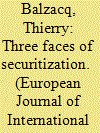

|
|
|
|
|
|
|
|